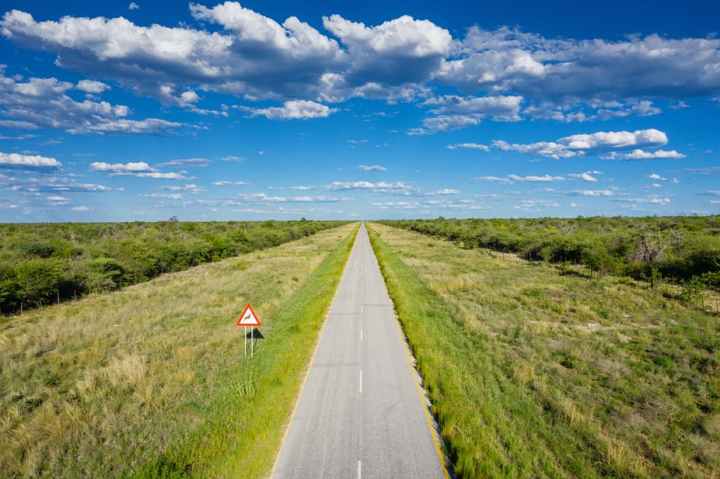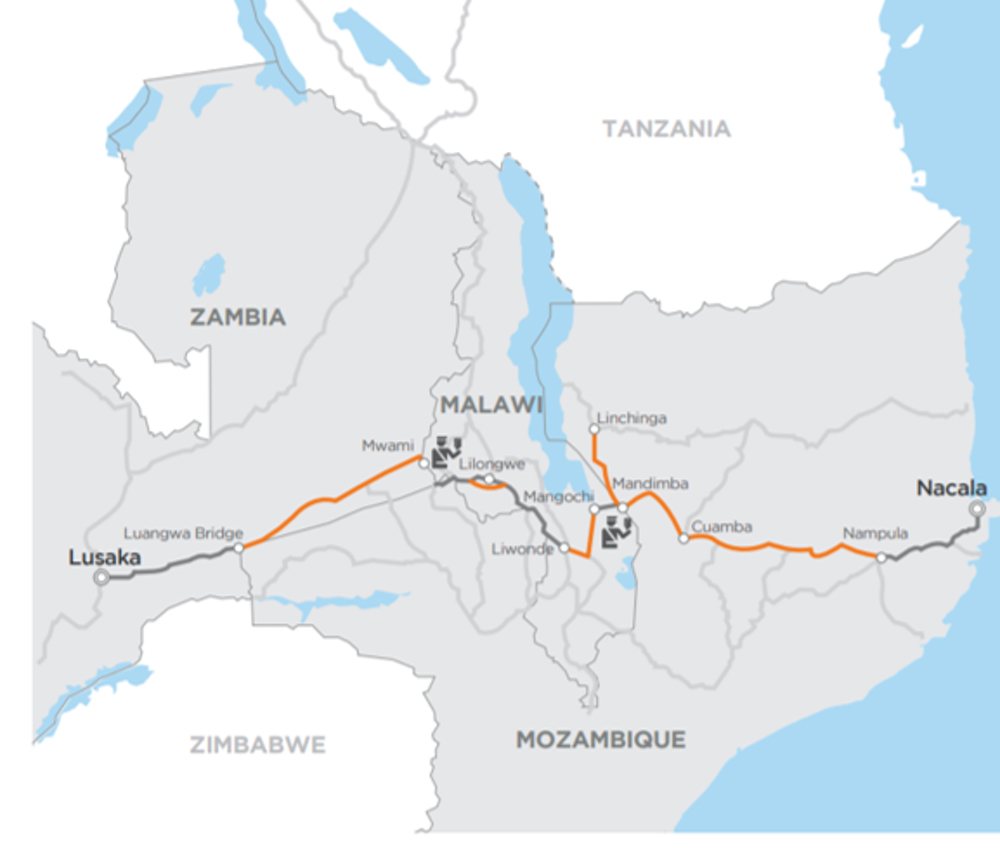THE CONVERSATION
Africa’s expanding road network may significantly impact multiple ecosystems — we reviewed the evidence

When road development cannot realistically be avoided in ecologically sensitive areas, effective mitigation strategies need to be developed and implemented. Conservation planners and environmental impact assessment practitioners play a vital role in this ongoing process in Africa.
The mission to integrate African economies relies on the development and construction of major infrastructure, from roads to railways and ports across the continent. For instance, the 1,900km Nacala corridor aims to connect the landlocked regions of Zambia and Malawi, as well as the interior of Mozambique, to the Nacala port on the Indian Ocean.
Many researchers claim these large-scale road developments will have detrimental impacts on natural ecosystems. They are concerned about a reduction in habitat availability and connectivity. Roads can also lead to changes in land use, create illegal access into previously inaccessible areas, and result in conflict between people and wildlife.
Despite concern and speculation about the environmental impacts of future road development in Africa, there has up to now been very little systematic evaluation of evidence of these impacts.
We decided to fill this gap. In a systematic review of existing literature, we extracted and synthesised information on about 270 reported effects of roads on ecosystems. We also identified underlying mechanisms inside and outside protected areas in different sub-regions.

The Nacala Corridor is one of 17 major corridors proposed for development across the African continent. It’s one of several corridors proposed to connect East and Southern African countries and will be 1900km long, 971km of which is for road infrastructure. The colour associated with the road corridor (line segment) describes how the road was financed. African Development Bank 2019
This helped us build a greater understanding of road impacts in sub-Saharan Africa, as well as the conditions under which future roads might pose a significant threat.
The impacts of roads
We found the reported effects of roads were usually related to land cover (change in type or degradation) and biodiversity (impacts on species composition or distribution).
Our findings suggest that the presence of roads, even inside protected areas, may pose a significant threat to species. The interactions between roads and species were not the same in all regions. Roads in and around protected areas had more negative impacts in central Africa than in southern Africa.
In many instances, roads were associated with a decrease in animal abundance. The main reasons were that roads were a barrier to the movement of animals, and they gave hunters and poachers access to previously unreachable habitats. Some road systems restricted the distribution range of animals.
But not all species responded in the same way. Some animals — like gorillas, bovids, carnivores and sometimes elephants — did not always avoid areas close to roads. Instead, they used roads as corridors for movement or even as foraging sites. In most published studies in our review, however, these mechanisms were usually speculated and required additional rigorous long-term studies for validation.
The review showed that roads, especially major ones, also had a strong influence on land use patterns. When roads created connections to previously inaccessible land, markets, cities and economic opportunities, they stimulated activities such as agriculture and logging. Roads also increased land degradation in many areas, often triggering erosion and soil loss.
What to expect
Our review revealed that the road-effect zone was typically between 1km and 7km for larger mammals. Animals in these zones may be forced to restrict their movement and thus reduce their home range size.
Future road development will most likely promote landscape transformation processes as far as 10km away from roads. Secondary road effects (such as further road development), as seen in the Amazon, can extend far deeper into core natural habitats. Road development may promote local economic activities and transitions from farmland to built-up areas. Cropland expansion can be expected around major roads that provide access to markets. New roads may increase logging, causing substantial deforestation and a change of land use to large scale agriculture.
If not constructed and managed carefully, roads may lead to erosion, soil loss and flooding in many areas.
Addressing the impacts of roads
Where the potential impacts of future road development have not been considered and development has already started or completed, it may be late for conservation efforts in some areas, especially if formal protection status is not allocated fast enough.
Intervention at the design and construction phases of road development is critical for mitigating many of the effects we found in this study. Early phases should identify alternative routes to avoid areas of high ecological value. Given the size of the transportation network envisaged for the African continent, our study calls for a pan-African response.
When road development cannot be avoided in ecologically sensitive areas, effective mitigation strategies need to be developed. Conservation planners and environmental impact assessment practitioners play a vital role in this process.
There are some well-researched measures to be found in the Handbook for Road Ecology. Other complex effects (such as illegal hunting and harvesting or land-use changes) are often unintended consequences of roads and more difficult to address. They may depend on law enforcement and policy.
If the past is an indication of the future, new road development will have a strong influence on species distribution and land cover patterns in sub-Saharan Africa. Identifying how these impacts develop allows planners to better predict where and under what conditions roads might be a serious problem for different species and ecosystems more broadly. DM/OBP
Lavinia Perumal — PhD candidate Department of Environmental & Geographical Science, University of Cape Town; Mark New — Director, African Climate and Development Initiative, University of Cape Town; Matthias Jonas — Senior Research Scholar Exploratory Modeling of Human-natural Systems Research Group — Advancing Systems Analysis Program, International Institute for Applied Systems Analysis (IIASA); Wei Liu — Guest Research Scholar, International Institute for Applied Systems Analysis (IIASA).




















 Become an Insider
Become an Insider
“Conservation planners and environmental impact assessment practitioners play a vital role in this process.”
… only if African governments decide to curb their enthusiasm for acquiring vast fortunes at the expense of their own countrymen.
South Africa’s environmental law is leagues ahead of the rest of Africa and even then it often either falls foul of government incompetence and/or corruption, or gets trampled on by DME (Department of Minerals and Energy). To expect African governments to somehow do any better at putting habitat conservation higher up on their priority lists is wishful thinking at best.
Furthermore, I am very suspicious of any “development” sponsored by other nations that need, above all, raw materials from Africa. The elephant in the room here is of course China, who are building great stretches of road and rail into Africa under the guise of “kickstarting human development”. I highly doubt their motives are even remotely charitable. Their obvious high demand for raw materials means their motives are much more likely to be to streamline their own exploitation of African resources.
China’s track record of respect for human rights also tells us a great deal about how they go about their business and there is no reason to think it would be any different in Africa.
That’s why the Chinese are known as the new colonialists. Nothing is built to last and everything that they build falls apart or gets washed away after a few years.
Historically some colonialists did build things to last because they intended (or had no choice) to settle the new lands instead of stripping the raw materials.
Perhaps a better word for the Chinese in Africa is “parasitism”.
This appears to be a very one-sided article. Competent road engineers do in fact consider the effects mentioned by the writers of this article – the problem lies with governments who select their professional engineers on factors other than competence. Also roads have been for decades acknowledged as the most significant influence on the development of an economy, AFTER education. The multiplier effect, that is return on investment for roads has been shown to exceed 7 times. Perhaps a crude or simplified response to the article is “why not all go and live in the bush and forget about social and economic development?”
Dr. M F Mitchell Pr. Eng., D.Eng., Ph.D., M. Admin.
Perhaps a crude and simplified response to this comment is: how many SA road engineers can be considered ‘competent’?
David – While I am admittedly biased, but from working in the industry for over 30 years I can confidently say that SA roads engineers are amongst the best in the world. As Dr Mitchel implied most problems arise from procurement and/or political areas not engineering or environmental professional competence.
While the authors do not make any false statements and advance some valid concerns the article is unfortunately misleading due to its lack of context and what is not said:
– There is a huge difference in the environmental impact of new roads being built where there are currently no or limited existing roads (aka greenfield projects) versus the impact of the upgrading and improvement of existing routes (which constitute the overwhelming majority of roads infrastructure project) . This is not clarified.
– Most of the planned 17 major corridor projects in Africa predominately involve upgrading existing routes and are not greenfield projects or may have only limited sections that are greenfield. These corridors are also generally through areas already highly influenced by human settlement and agriculture. The authors should have been specific as to which of the 17 African corridor projects actually do affect environmentally sensitive and/or protected areas instead of implying that all of them do.
– World Bank studies show that $ for $ building new roads has a greater socio-economic benefit impact than water, electricity or any other public infrastructure provision . Only education has a higher return on investment. So while there is merit in being particularly careful about avoiding, minimizing and/or mitigating NEW roads near, in or through protected and environmentally sensitive areas (as was done for the N2 Wild Coast road in SA) one should also balance the arguments.